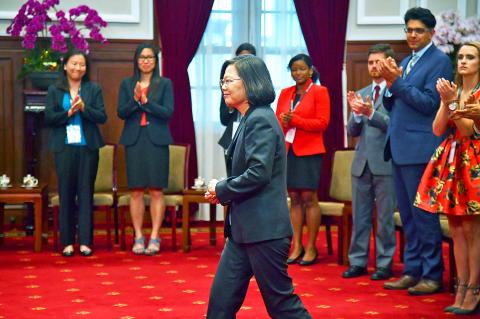President Tsai Ing-wen (蔡英文) yesterday called a meeting of the National Security Council (NSC) to discuss possible actions and contingency plans should the escalating trade war between the US and China affect Taiwan.
Premier William Lai (賴清德), NSC Secretary-General David Lee (李大維) and Presidential Office Secretary-General Chen Chu (陳菊) were among those who attended the meeting.
The US tariffs on Chinese steel and aluminum implemented in March was of great concern to Tsai, who ordered the council to establish a task force to monitor the issue, analyze its possible effects on Taiwan and develop contingencies, Presidential Office spokesperson Alex Huang (黃重諺) said.

Photo: CNA
Local businesses and Taiwanese firms in China should not be affected by the 25 percent tariffs imposed on Chinese goods per Article 301 of the US Trade Act, Huang said.
US tariffs that are scheduled to take effect on July 6 for List 1, which includes 818 items, has been included in the assessment, he said.
Taiwanese businesses supply a very small amount of the items on List 2, which includes petrochemical, mechanical and semiconductor items, Huang said.
However, if the US imposes another 10 percent tariff on US$2 trillion worth of Chinese goods, the situation would no doubt escalate, the assessment said.
Further tit-for-tat measures between the US and China could make waves in financial markets and lead to trade protectionism, it said.
While there is a chance that continued escalation could run out of control, that possibility is not high, the assessment added.
Taiwan should consider structural changes to its global and regional supply chain, as the US-China trade conflict is showing signs of protraction, it said.
Such changes could indicate a shift in the global industry supply chain and the role of Taiwanese businesses in the regional supply chain, as well as trilateral relations between Taiwan, the US and China, the assessment said.
Tsai instructed the council to continue to monitor the trade conflict and prepare government agencies for countermeasures, Huang said.
“The president has also instructed the Executive Yuan and other agencies to issue statements to allay the sense of unease among local industries regarding the US-China trade war,” Huang said.
The task force consists of the Ministry of Economic Affairs, the Executive Yuan’s Office of Trade Negotiations, the central bank, the Ministry of Foreign Affairs, the Mainland Affairs Council and the National Security Bureau.
“The government should place the nation’s strategic, economic and industrial benefits at the fore when mulling contingency plans and countermeasures,” Huang quoted Tsai as saying.

A magnitude 7.0 earthquake struck off Yilan at 11:05pm yesterday, the Central Weather Administration (CWA) said. The epicenter was located at sea, about 32.3km east of Yilan County Hall, at a depth of 72.8km, CWA data showed There were no immediate reports of damage. The intensity of the quake, which gauges the actual effect of a seismic event, measured 4 in Yilan County area on Taiwan’s seven-tier intensity scale, the data showed. It measured 4 in other parts of eastern, northern and central Taiwan as well as Tainan, and 3 in Kaohsiung and Pingtung County, and 2 in Lienchiang and Penghu counties and 1

FOREIGN INTERFERENCE: Beijing would likely intensify public opinion warfare in next year’s local elections to prevent Lai from getting re-elected, the ‘Yomiuri Shimbun’ said Internal documents from a Chinese artificial intelligence (AI) company indicated that China has been using the technology to intervene in foreign elections, including propaganda targeting Taiwan’s local elections next year and presidential elections in 2028, a Japanese newspaper reported yesterday. The Institute of National Security of Vanderbilt University obtained nearly 400 pages of documents from GoLaxy, a company with ties to the Chinese government, and found evidence that it had apparently deployed sophisticated, AI-driven propaganda campaigns in Hong Kong and Taiwan to shape public opinion, the Yomiuri Shimbun reported. GoLaxy provides insights, situation analysis and public opinion-shaping technology by conducting network surveillance

‘POLITICAL GAME’: DPP lawmakers said the motion would not meet the legislative threshold needed, and accused the KMT and the TPP of trivializing the Constitution The Legislative Yuan yesterday approved a motion to initiate impeachment proceedings against President William Lai (賴清德), saying he had undermined Taiwan’s constitutional order and democracy. The motion was approved 61-50 by lawmakers from the main opposition Chinese Nationalist Party (KMT) and the smaller Taiwan People’s Party (TPP), who together hold a legislative majority. Under the motion, a roll call vote for impeachment would be held on May 19 next year, after various hearings are held and Lai is given the chance to defend himself. The move came after Lai on Monday last week did not promulgate an amendment passed by the legislature that

Taiwan is gearing up to celebrate the New Year at events across the country, headlined by the annual countdown and Taipei 101 fireworks display at midnight. Many of the events are to be livesteamed online. See below for lineups and links: Taipei Taipei’s New Year’s Party 2026 is to begin at 7pm and run until 1am, with the theme “Sailing to the Future.” South Korean girl group KARA is headlining the concert at Taipei City Hall Plaza, with additional performances by Amber An (安心亞), Nick Chou (周湯豪), hip-hop trio Nine One One (玖壹壹), Bii (畢書盡), girl group Genblue (幻藍小熊) and more. The festivities are to